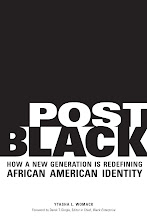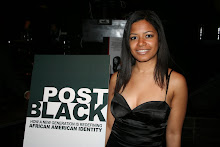Nnedi Okorafor is a fantasy/science fiction writer and English professor. Her latest book is Who Fears Death about Onye, a woman with a magical destiny in post apocalyptic Africa.
YLW: How did you become a science fiction writer?
NO: When I was a kid I read a lot of books. I read far and wide and not just science fiction. I was attracted to these stories with magical things in them. I started writing my own stories when I was 20. I wrote magical realist stuff. I started off writing fantasy. It was very natural for me. It wasn't like I was trying to write it. However, people tried to turn me away from that because it’s not academic. I started getting things published. Then I realized I wasn't seeing Africa written about in the future so my fantasy writing became part science fiction.
YLW: What's the difference between fantasy and science fiction?
NO: Fantasy involves stories where strange things happen that are due to magic, the mystical, or the unexplained. Science fiction is when the strange things that happened are explained through science, even if those things aren’t possible yet. I tend to mix the two. In my first book Zahrah the Windseeker, you have plant technology and there are technology producing plants. But you also have a girl who has the ability to fly.
YLW: Your book includes a wide range of elements from shamanism to female circumcision.
NO: There's shamanism, there's Juju in it, there's magic, genocide, female circumcision. It deals with issues of African men and women. I based my Juju on actual Ebo traditional beliefs. It pulls on the fantastical.
YLW: Afro futurism is a new term to explain science fiction involving the African Diaspora. Is your work afro futurist? .
NO: People have asked me if I consider it to be afro futurism. By that definition, certainly. But I tend to resist a lot of the labels because labels can be very confining.
YLW: How so?
NO: People who usually don't read science fiction won't read it if it’s labeled. Octavia Butler wrote Kindred, a time travel story. It falls in the line of black literature, but if you put sci fi on it, some people won't read it.
Some reviewers have called Who Fears Death uncharacterizable. Unless people know what something is they freak out or if they can't name it they ignore it. The novel before Zara, my first novel was an adult novel, but when my agent shopped it around it got past the acquisitions editor, but when it got to the money part the reps didn't know what to call it. It's fantasy, but it's too literary. Is the main character African or African American? They couldn't label it properly and because of that it got rejected and I dealt with that for three years. And then I wrote Zahrah the Windseeker.
YLW: I'm sure people compare you to legendary sci-fi writer Octavia Butler. What are your similarities and how do you differ?
NO: I'm a huge Octavia Butler fan. She blew my mind. I was writing these things and I didn't realize that what I was writing could be published until after I read her work. First and foremost, she writes in a sparse format, almost journalistic. There's no mincing of words. I always liked how she could draw you into the story to the point where you forget that you're reading. We both deal with gender and race. We write complex characters.
We differ when it comes to setting. What I write takes place in Africa or a place like Africa. And Octavia's books tend to be in the U.S or she starts in Africa and goes elsewhere. So our settings are a little different. I pull from a lot of Nigerian folklore and Nigerian myth. She pulls from that, too, but not so much.
I feel like every science fiction and fantasy writer, we are all compared to Octavia and that's because she is one of the only black fantasy and science fiction writers, so I guess these reviewers can't compare us to anyone else unless their black.
YLW: How have people responded to your work?
NO: Mostly, really positive. I've had some hate mail from people who feel I'm airing African's dirty laundry.
YLW: Hate mail?
NO: I get emails calling me a witch. In Zahrah the Windseeker, the main character is Dada, which means a baby that's born with locked hair. Before colonialism that was very special. But after colonialism it was considered evil. And this character realizes she has the ability to fly. With my book Who Fears Death, I have opinions about female circumcision and I deal with that in the book. At my first book signing for Who Fears Death, in Michigan, these African academics came to attack me. There's a female circumcision scene in the book, it's pretty brutal. I read it and one of the professors said in a real circumcision there's no lights. Well, this is science fiction. They feel I had no right to speak on this because I hadn't been at an actual circumcision.
YLW: Do you feel some of the criticism has to do with you being a child of Nigerian immigrants born in America and not Africa?
NO: Definitely, my fourth was titled Akata Witch. It's a derogatory term for African Americans, or American born Nigerians. Akata means bush animal. It's not a very nice term. The book deals with some of those issues.
YLW: In Post Black, I write about African immigrants and one American born Nigerian said she felt she had to defend Africans to African Americans and African Americans to Africans.
NO: That's exactly what I had to deal with. It's like you belong but you don't belong. The thing is, it's positioned that we can bridge a lot of those gaps. I understand both sides. But sometimes you don't really want to be on the defense. I can see a non fantasy book in me on this one.
For more information go to www.nnedi.com






Brilliant! Love this interview - especially in light of how Afrofuturism is typically conceptualized as a body of work that only competes with Western conceptions of time and temporality (i.e. progress). Okorafor's intermingling of various temporalities and "genres" is so refreshing for both academics and casual readers.
ReplyDeleteNice post! This is a very nice blog that I will definitively come back to more times this year! Thanks for informative post.
ReplyDeleteblocktalks